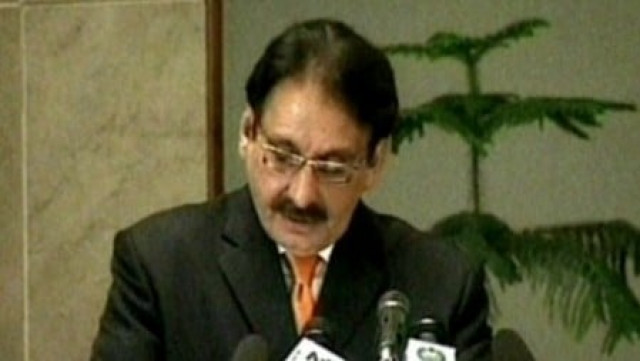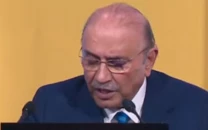Who will appoint judges in 90-day interregnum?
The judicial commission and parliamentary committee would be non-operational for 90 days before the next elections.

Institutions need to be functional under all circumstances, the CJP remarked during the course of hearing of identical petitions challenging some provisions of the 18th amendment, including Article 175-A which relates to the appointment of adjudicators in superior courts.
Additional Attorney General KK Agha resumed his arguments before the 17-member larger bench headed by Chief Justice Iftikhar Muhammad Chaudhry and pleaded that parliamentary committee was established under a constitutional provision.
According to the Al-Jihad Trust case, the president can only exercise his powers with regard to the appointment of judges in consultation with the prime minister, Justice Shakirullah Jan remarked.
There are at least eight clauses in the constitution in which the role of the prime minister is equivalent to that of the Post Office and he had the same role in previous system regarding judges’ appointment, Justice Asif Khosa remarked.
The CJP interjected that in the parliamentary form of government, the prime minister is the chief executive and his role in the process of judges’ appointments cannot be restricted.
Agha pleaded that the new system of appointment of judges is made up of a judicial commission and a parliamentary committee and cannot be dealt with separately and that the recommendations of parliamentary committee would strengthen the parliamentary system.
The CJP remarked that being the chief executive, PM runs the state affairs, (then) how his role could be diminished in judges’ appointment process. If the National Assembly completed its tenure then in the absence of a parliamentary committee how the judges’ appointment would be made?
Replying to the CJP’s query, KK Agha said that during the composition of parliamentary committee public will had been considered. He left many questions unanswered, saying that the attorney-general would satisfy the court.
Nasrullah Warraich, chairman of Pakistan Bar Council, presented arguments in support of the 18th amendment. He contended that it was difficult for noble people to contest election or get favourable votes to reach parliament, reiterating that political bigwigs did not confer party tickets to such genuine candidates. He was arguing on Article 63-A of the 18th amendment which empowers the party head to expel the party member on the charge of misconduct or floor crossing.
Justice Asif Khosa restricted Warraich from “maligning democracy and politicians”. “It is a serious issue and you should stay focused on your arguments rather than insulting our parliamentarians and democratic system,” Justice Khosa suggested to the federation’s counsel.
Justice Khilji Arif Hussain remarked that it was amazing to hear from federation’s lawyer that “bus aisay hi log” (unsuitable candidates) become part of parliament.
The hearing was adjourned until Thursday (today).
Published in The Express Tribune, August 12th, 2010.



















COMMENTS
Comments are moderated and generally will be posted if they are on-topic and not abusive.
For more information, please see our Comments FAQ